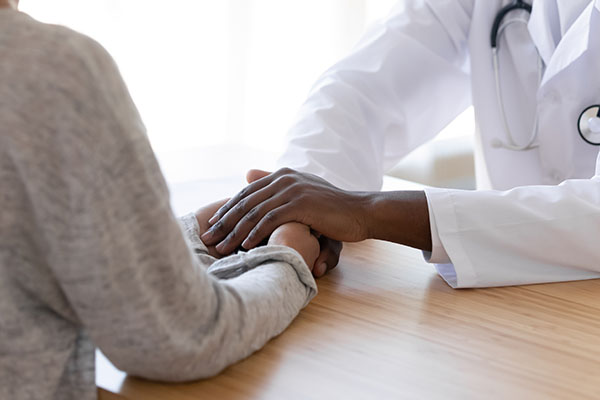What To Know Before Visiting an Oncologist

An oncologist is a medical specialist who focuses primarily on preventing, diagnosing, and treating various cancers. Oncologists are also referred to as cancer specialists, as they are patients’ primary healthcare practitioners throughout cancer treatment. The field of oncology has three major areas based on treatments: medical oncology, radiation oncology, and surgical oncology. It is a good idea to learn and understand how oncology works before your first visit with an oncologist and what to ask during your appointment.
What is an oncologist?
Oncologists treat all types of cancers, including breast, lung, ovarian, prostate, and kidney, among others. Many oncologists specialize in a specific cancer type; for example, an oncologist who treats patients through radiation is called a radiation oncologist. Medical oncologists treat cancers through non-invasive methods, such as medication, chemotherapy, biological therapy, hormone therapy, and targeted therapy. Surgical oncologists perform biopsies, diagnose cancer types and stages, and remove tumors and surrounding tissues.
Patients who suspect they may have cancer or were referred by their primary care physician due to suspicion, typically visit a surgical oncologist first. A surgical oncologist runs tests, examinations, and necessary assessments to determine the cancer type and stage the patient is in. They will then discuss the patient’s options, at-home care, necessary lifestyle adjustments, and, at times, refer them to another type of oncologist, depending on their cancer type.
What to bring to the first appointment
During a patient’s first oncology appointment, they will want to collect and discuss the patient’s medical history, records about their cancer diagnosis, including lab work and biopsies, radiology scans they have already had done (X-rays, CT, MRI, Pet Scans). If these are done at other centers, ask for a digital copy of the scans to bring to the appointment, and the patient’s medical referral, if they have one. It is also a good time to review insurance coverage and ensure the providers used are in your insurance network. If they are out out-of-network, you could be responsible for much higher costs related to your care.
What to expect during the first visit
A patient's first oncology appointment is typically a consultation, in which we will ask about their medical history and questions related to their cancer diagnosis. For example, we may ask questions like:
- What symptoms made the patient go to their doctor in the first place?
- What tests did the doctor order?
- Was the patient referred to additional specialists?
- Has the patient previously been treated for cancer?
These questions will give us a better understanding of what symptoms the patient experienced and how the primary care physician assessed and diagnosed their case. We can then discuss the patient’s possible treatment options. In many types of cancer, additional testing can help clarify the diagnosis or even guide the choice of treatments.
Questions to ask the oncologist
It is important that patients are fully aware of their condition and understand the steps going forward. Oncologists do their best to relay this information to patients completely. However, patients can also ask certain questions, beginning with “What is the standard treatment for my type of cancer?” From there, other important questions include:
- When should I begin treatment?
- What are the benefits of the recommended treatment?
- What are its potential risks and side effects?
- How will treatment affect my daily routine? Can I continue to work through treatment?
- Will treatment impact my fertility? What do I need to know about fertility preservation if I plan to have children?
- What should I do if I develop new symptoms after I begin treatment?
- What support resources are available to help me cope with my diagnosis?
- Whom should I call if I have additional questions after I leave the office?
Discussing treatment and possible outcomes
During the first few visits, we can make a much more accurate prognosis or outcome after we get a better idea of the patient’s overall case. We can also discuss the patient’s desired results, willingness to go through the necessary steps, and what their support system looks like. After that, it is entirely up to the patient when they are ready, though timing is of the essence with a condition such as cancer. Conversations about prognosis are complicated because each person is unique and responds differently to a treatment. Therefore, the statistics about the prognosis for the patient’s kind of cancer may not apply to them specifically.
Do not put your treatment on hold
Cancer can be a terrifying diagnosis a person may ever receive, but you do not have to do it alone. Our team looks forward to participating in your treatment journey and recovery. Call our office at (856) 475-0876 to learn more or schedule an appointment.
To learn more about our services, visit https://lindenbergcancer.com or call our Marlton office at (856) 475-0876 to schedule an appointment.
Check out what others are saying about our services on Yelp: Oncologist in Marlton, NJ.
Recent Posts
When most people think of cancer treatment, they think of chemotherapy. However, this is only one of many treatment options available. An oncologist can provide personalized cancer treatment that aims to remove and kill the cancer, as well as to prevent it from coming out of remission.Cancer treatment is not one size fits all. An…
Anemia occurs in people who lack enough healthy red blood cells and hemoglobin to carry oxygen to each organ. It has many forms and causes, all of which can be short-term or long-term. Fortunately, a hematologist offers multiple treatment options to address all concerns.When one's red blood cells do not work properly, anemia usually follows…
Blood disorder specialist treat and diagnose blood disorders, from anemia to leukemia. Regardless of whether a patient has a cancerous or noncancerous blood disorder, consulting one of these specialists can lead to better health outcomes. A specialist will work to find an effective treatment that prevents the disorder from progressing, as well as work to…
Oncologist are known as cancer doctors or specialists who diagnose and treat various types of cancer, meaning people should not wait until there is a suspicion of the disease before scheduling an appointment. In fact, with cancer, timing is of the essence. Patients with any concerns can learn how regular visits to an oncologist can…


